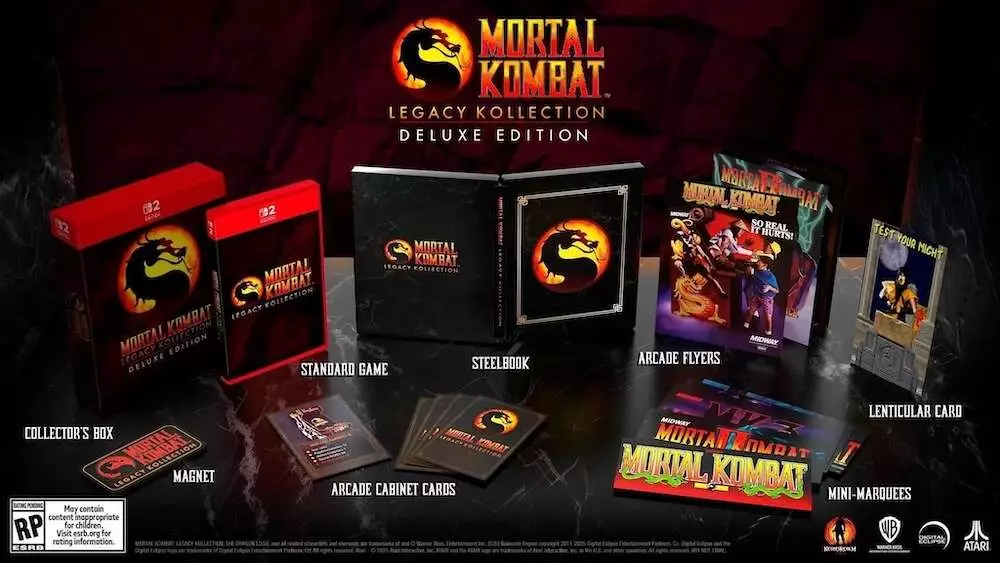The upcoming release of the Mortal Kombat: Legacy Kollection marks a significant milestone for both die-hard fans and newcomers to the legendary franchise. This meticulously curated compilation isn’t just another port — it’s a passionate homage to over three decades of martial arts mayhem. Through its array of physical editions and bonus content, Warner Bros. Interactive, Atari, and Digital Eclipse demonstrate an understanding of their audience’s yearning for tangible memorabilia as much as gameplay nostalgia. The Deluxe and Collector’s Editions, in particular, elevate the collection from a mere compilation to a coveted collector’s item, blending the digital with the physical in a way that reasserts the enduring appeal of physical media in a digital age.
The strategic release of multiple editions — including a limited-time Collector’s Edition, a Deluxe Version with an exquisite steelbook case, and the standard Day 1 Edition — signifies an astute recognition of the franchise’s multifaceted fanbase. These editions are designed not merely for gameplay but also as nostalgic artifacts, containing revered collectibles such as arcade flyers, mini marquee replicas, and detailed lore books. It’s an acknowledgment that Mortal Kombat’s cultural impact extends far beyond the arcade, into the realm of memorabilia that continues to define collectible culture for years to come.
An Unmatched Retrospective and Technical Commitment
What elevates Mortal Kombat: Legacy Kollection above comparable retro compilations is its comprehensive approach to authenticity and quality. The inclusion of multiple versions of classic titles — from arcade cabinets to home consoles and even handheld versions — demonstrates an obsessive attention to detail. Notably, the game lineup comprises an array of titles spanning the franchise’s original era, from the iconic Mortal Kombat series starting in 1992 to more obscure titles like Mortal Kombat: Deadly Alliance and Mortal Kombat Trilogy.
Gameplay fidelity is paramount here. The use of rollback netcode for online modes ensures that players can enjoy these classic titles in the most authentic manner possible, replicating the feel of an actual arcade experience. This is a significant upgrade over many past collections, which often sacrificed quality for convenience. The commitment to maintaining the integrity of the original games underscores a respect for Mortal Kombat’s roots and a clear understanding of what fans truly value — precision, authenticity, and nostalgia.
Moreover, the collection’s appeal extends beyond gameplay. The inclusion of behind-the-scenes documentaries, interviews with Ed Boon, and detailed character histories reflects a deeper appreciation for the franchise’s lore and development story. For aficionados, this transforms the collection into an educational resource and a celebration of the franchise’s cultural significance, not just a bundle of old games.
Strategic Release and Market Impact
The manner of distribution signals an evolution in how fighting game collections are marketed and consumed. The preorders at major retailers like Amazon, Walmart, Best Buy, and specialty outlets such as Limited Run Games, demonstrate that Warner Bros. and their partners are investing heavily in driving anticipation and limited-edition scarcity. The fact that the Nintendo Switch 2 editions cost more—$10 extra—indicates a recognition of the console’s premium status and the added value of physical media for collectors in a console generation that leans towards digital downloads.
What’s particularly notable is that the Switch 2 physical editions include the entire collection on a Game Card, not just a code. This decision firmly anchors the collection in the realm of true physical media, a stance that resonates deeply with collectors wary of digital-only releases. It signals an understanding that the physicality of gaming remains vital—especially for a franchise as iconic and long-standing as Mortal Kombat.
Furthermore, the timing of the release at EVO 2025, a premier fighting game tournament, is a shrewd move that aligns the collection with the competitive community. It emphasizes that Mortal Kombat is not merely a nostalgic relic but a vibrant, ongoing force in the fighting game scene. This strategic positioning could very well redefine how retro collections are perceived — not just as legacy artifacts but as contemporary staples that coexist with modern innovation.
The Mortal Kombat: Legacy Kollection exemplifies a brand that values its history while embracing the future. By offering a range of editions filled with collectible treasures and maintaining high standards of authenticity and quality, Warner Bros. and their partners are setting a new benchmark for fighting game compilations. For fans and collectors alike, this is not just a nostalgia trip — it’s a bold statement of dedication, craftsmanship, and the enduring power of Mortal Kombat.

